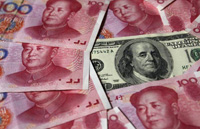Sunac China to buy 49.3% stake in troubled developer Kaisa
(Agencies) Updated: 2015-01-30 14:18
 |
|
High-rise apartment buildings of a residential property project are under construction in Huaian city, East China's Jiangsu province, on Nov 9, 2014. [Photo/CFP] |
Kaisa scare spreads to top-rate mainland firms By Agencies
The surge in borrowing costs for Chinese mainland junk bond issuers is spreading to investment-grade companies amid the nation's corruption campaign and following missed payments by Kaisa Group Holdings Ltd.
The average spread at issuance on US dollar-denominated notes from the mainland sold since Jan 1 with investment-grade ratings has leapt to 259 basis points from 207 in the second half of last year, data compiled by Bloomberg show.
Corporate securities from the mainland in the US currency have lost 0.45 percent this year. Only debt from Bangladesh, Mongolia and Sri Lankan companies has lost more among emerging Asian countries, JPMorgan Chase indexes showed.
Concerns are mounting that even the mainland's best-rated companies may get caught up in government probes as President Xi Jinping targets both "tigers and flies" in his anti-graft drive. In the highest profile cases, at least seven officials have been removed at China National Petroleum Corp including its former chairman Zhou Yongkang, a former member of the Politburo Standing Committee in charge of domestic security.
"The China premium used to be close to nothing when compared to the developed names globally," said Raymond Chia, head of credit research in Asia ex-Japan for Schroder Investment Management Ltd, which controls about $450 billion. "But now, with the corruption clampdown which makes the government the locksmith, as well as the commodity price impact, investors are having a more careful look at Chinese names."
Kaisa is being investigated by the government for dealings with official Jiang Zunyu, who's been under a probe since October, people familiar with the matter said on Jan 13. Jiang had served as party chief of Shenzhen's Longgang district, where some approval procedures for Kaisa projects were suspended last month.
The builder failed to make an interest payment due Jan 8 on $500 million of 10.25-percent US dollar bonds before getting a waiver on a HK$400-million loan from HSBC Holdings Plc. The notes slid 40 percent last month as some projects were blocked and founder Kwok Ying-shing quit, reaching a low of 29.9 cents on the US dollar on Jan 7. Speculative grade Chinese notes fell 3.9 percent this year, a Bank of America Merrill Lynch index shows.
"The recent spate of events has sparked a scramble by investors to reassess the dynamics of pricing in political and event risks in China," Lee Chok Wai, a credit analyst in Singapore at Oversea-Chinese Banking Corp, wrote in a Jan 21 report.
- National social security fund investment up 11.43% in 2014
- Tencent inks exclusive online partnership for NBA games in China
- Chinese regulator tightens screws on securities firms
- Sunac China to buy 49.3% stake in troubled developer Kaisa
- China Trade imbalance beteen China and France to be eased
- We run errands so you don't have to
- China to hold 2nd World Internet Conference in October
- China has growth potential: McKinsey expert

















